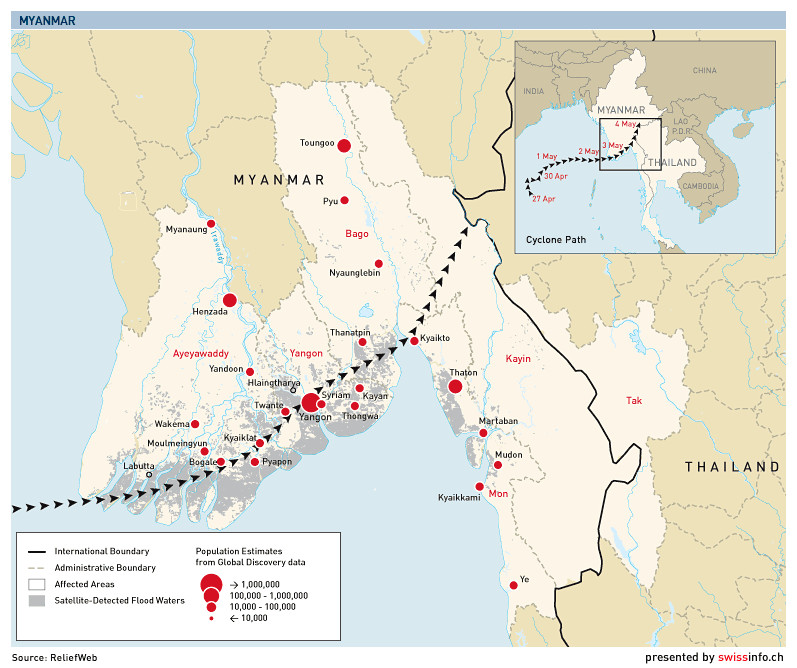
Myanmar regime weathers the storm

The regime in Myanmar appears not to be under threat despite the crisis caused by cyclone Nargis and mounting international pressure, a Swiss expert believes.
Matthias Huber of the Association Suisse-Birmanie (Switzerland-Myanmar Association) says there is little will among the people to stand up against the military dictatorship.
“I have taken an interest in Myanmar for 30 years. At every crisis I tell myself that the regime cannot go on as it is, and that changes are bound to happen. But the regime is still there,” he told swissinfo.
“Buddhism, non-violence, hope for a better existence in a future life all go to make people fatalistic. Not to mention the fear of standing up to more than 400,000 troops who have no hesitation about firing into crowds,” he explained.
Huber pointed to the fact that since the military coup in 1988 the regime had weathered all crises. These included the demonstrations by monks last September, which were violently suppressed.
His opinion is shared by Léon de Riedmatten, Bangkok representative of the Geneva-based Centre for Humanitarian Dialogue, who has in the past mediated between the Myanmar regime and the opposition leader Aung San Suu Kyi.
“General Than Shwe and his number two, Maung Aye, have already shown in the past to what extent they can withstand all earthquakes,” he told the French news agency, AFP.
Huber also pointed the finger at Myanmar’s neighbours. “The Association of South East Asian Nations (Asean) has always defended the principle of non interference in the internal affairs of member countries,” he said.
Power struggles
Huber, who spent long periods in Myanmar before being banned, thinks change can only come from inside the regime.
“Than Shwe is very sick and power struggles over his succession are certainly already going on,” he pointed out. But he sees another possibility as well.
“It is not impossible that part of the army could end up siding with the people against the regime.” This is all the more likely if the government continues to hold up aid to the cyclone victims and goes on neglecting the needs of the country as a whole, he believes.
Hundreds of thousands of people are at risk in the short and medium term, since not only the current rice stocks have been lost but also the seeds for the next planting season, which should start next month.
He warns that Myanmar has quintupled its rice exports since the beginning of the year, and is in danger of running out unless it gets massive new supplies from abroad.
Aid essential
More than two weeks after the cyclone ravaged the Irrawaddy delta in the southwest of Myanmar, the military regime is not giving up its tight control of the country and its borders despite growing appeals from the international community.
“The regime’s ability to organise in the face of this disaster is pretty well nil,” said Huber.
For his part, de Riedmatten called for a huge airlift with navy ships anchored close to Myanmar’s territorial waters and helicopters ferrying food and humanitarian aid into the country.
On Monday the regime agreed to allow Asean countries to coordinate international aid to the disaster victims. But it is still screening assistance even though three-quarters of the two million survivors have been left with absolutely nothing.
swissinfo, Frédéric Burnand in Geneva
Cyclone Nargis swept through the Irrawaddy delta in southwest Myanmar on May 3.
The government says nearly 78,000 people were killed and nearly 56,000 are missing.
According to UN humanitarian officials 2.4 million people are destitute.
On Monday, after an emergency meeting of the Association of South East Asian States (Asean), the Myanmar regime allowed medical teams start helping survivors.
Also on Monday, the authorities in Myanmar allowed UN under-secretary for Humanitarian Affairs, John Holmes, to visit the Irrawaddy delta.
The UN says its foreign staff have not been permitted to travel to the delta, where several hundred thousand survivors are reported to be suffering hunger, disease and a lack of shelter.
A fund raising conference is to be held in Myanmar’s largest city, Yangon, next Sunday under the aegis of the UN and Asean.


In compliance with the JTI standards
More: SWI swissinfo.ch certified by the Journalism Trust Initiative


























You can find an overview of ongoing debates with our journalists here . Please join us!
If you want to start a conversation about a topic raised in this article or want to report factual errors, email us at english@swissinfo.ch.